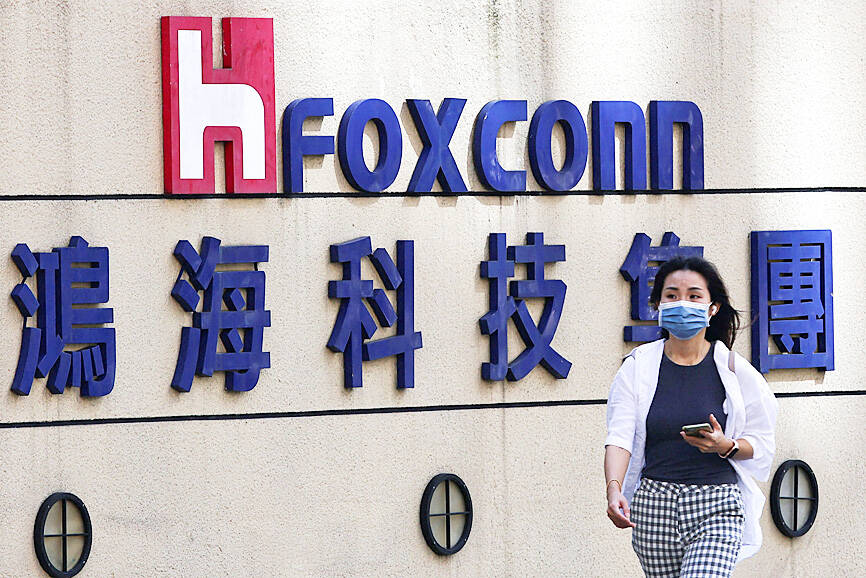Off to a slow start in the green energy game, iPhone assembler Hon Hai Precision Industry Co (鴻海精密) is looking to catch up and move toward meeting long-term emissions goals by investing in green energy funds and developing new types of alternative energy.
In an interview with CNA, Hon Hai chief environmental protection officer Hung Jung-chung (洪榮聰) said his company would need to use or buy 10 terawatt-hours (TWh) of green power a year worldwide by 2030 to meet its goal of cutting emissions by about 42 percent from 2020.
Hon Hai, also known internationally as Foxconn Technology Group (富士康科技集團), generated only 300 gigawatt-hours (GWh) in green power on its own worldwide last year, accounting for only 3 percent of the group’s total power consumption for the year, Hung said.

Photo: Ann Wang/Reuters
That is well off the pace of the goal it announced in April last year of having green energy account for no less than 50 percent of its electricity consumption in 2030, which would pave the way for reaching a goal of net-zero emissions by 2050.
To get to 10 TWh of green power, Hon Hai intends to invest more in green energy funds in China and Vietnam while forging partnerships in other parts of the world to gain access to all types of green energy, Hung said.
Another strategy is for Hon Hai to take stakes in foreign renewable energy developers and buy green power from foreign governments, which would help it secure green energy certificates and strengthen its bottom line, he said.
Meanwhile, weighing in on an issue that continues to spark debate in Taiwan, Hung said he was not opposed to keeping domestic nuclear power plants running as long as the nuclear waste was properly treated, because Taiwan needs stable sources of power.
Nuclear power could not be considered a renewable energy source, but it is a clean energy source without carbon emissions, he said.
Last month, President Tsai Ing-wen (蔡英文) reiterated the government’s goal to make Taiwan a nuclear-free country by 2025, by which time the 40-year operating licenses of all six of Taiwan’s operable nuclear reactors will have expired.
However, there are growing concerns that the phasing out of nuclear power will leave Taiwan vulnerable to power outages, especially as renewable energy development and even natural gas installations have fallen behind schedule.
On a smaller scale, Hon Hai is to increase the installed solar power capacity at its headquarters in New Taipei City’s Tucheng District (土城) to 716 kilowatt (kW) by the end of this year, from the current 65.3kW, Hung said.
According to Hon Hai, the headquarters consumed 18 GWh of power last year, and after its solar capacity expansion, it should generate more than 700 megawatt a year, or 3.8 percent of the total.
In addition to solar energy production, the Tucheng headquarters has also worked to cut waste by transforming it into energy, and the facility became the first factory to secure UL 2799, the highest platinum rating for zero waste to landfill, in Taiwan.

Intel Corp chief executive officer Lip-Bu Tan (陳立武) is expected to meet with Taiwanese suppliers next month in conjunction with the opening of the Computex Taipei trade show, supply chain sources said on Monday. The visit, the first for Tan to Taiwan since assuming his new post last month, would be aimed at enhancing Intel’s ties with suppliers in Taiwan as he attempts to help turn around the struggling US chipmaker, the sources said. Tan is to hold a banquet to celebrate Intel’s 40-year presence in Taiwan before Computex opens on May 20 and invite dozens of Taiwanese suppliers to exchange views

Application-specific integrated circuit designer Faraday Technology Corp (智原) yesterday said that although revenue this quarter would decline 30 percent from last quarter, it retained its full-year forecast of revenue growth of 100 percent. The company attributed the quarterly drop to a slowdown in customers’ production of chips using Faraday’s advanced packaging technology. The company is still confident about its revenue growth this year, given its strong “design-win” — or the projects it won to help customers design their chips, Faraday president Steve Wang (王國雍) told an online earnings conference. “The design-win this year is better than we expected. We believe we will win

Chizuko Kimura has become the first female sushi chef in the world to win a Michelin star, fulfilling a promise she made to her dying husband to continue his legacy. The 54-year-old Japanese chef regained the Michelin star her late husband, Shunei Kimura, won three years ago for their Sushi Shunei restaurant in Paris. For Shunei Kimura, the star was a dream come true. However, the joy was short-lived. He died from cancer just three months later in June 2022. He was 65. The following year, the restaurant in the heart of Montmartre lost its star rating. Chizuko Kimura insisted that the new star is still down

While China’s leaders use their economic and political might to fight US President Donald Trump’s trade war “to the end,” its army of social media soldiers are embarking on a more humorous campaign online. Trump’s tariff blitz has seen Washington and Beijing impose eye-watering duties on imports from the other, fanning a standoff between the economic superpowers that has sparked global recession fears and sent markets into a tailspin. Trump says his policy is a response to years of being “ripped off” by other countries and aims to bring manufacturing to the US, forcing companies to employ US workers. However, China’s online warriors